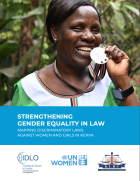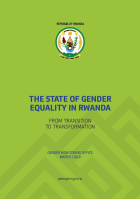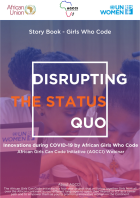1 - 14 of 14 Results
Date:
The main objective of this report is to assess the relevance and applicability of the development of an election-specific mechanism to monitor violence and discriminatory practices against women in elections and to determine if relevant early warning systems exist in Somalia.
Date:
UN Women and International Development Law Organization (IDLO), in partnership with the Kenya Law Reform Commission. Researcher/writer: Dr. Consolata Ngondi; Ms. Petronella Mukaindo
Date:
This Report presents the Africa Shared Research Agenda (ASRA) for ending gender-based violence (GBV), which was developed though a collaboration between UN Women Africa and the Sexual Violence Research Initiative. The ASRA is a set of research priorities for the field, developed through a participatory and consultative process and aims to inform investments in research over the coming 5-10 years for ending GBV in Central, East, Southern and West Africa.
Date:
The aim of the publication is to provide an understanding of the context of the eastern states, reflecting on the interplay between gender, conflict, and the environment. The findings of the study will support both AICS and UN Women in tack ling some of the differential impacts caused by conflict and environmental degradation on the lives of women.
Date:
This publication highlights the progress and prevailing gender gaps in Rwanda so far as far as Gender Equality and Women's Empowerment is concerned. It also gives insights into the state of gender equality in the National Strategy for Transformation (NST1) pillars.
Date:
The Report documents our work with communities and stakeholders to advance Gender Equality in Zimbabwe, the challenges, interventions and results achieved
Date:
29th of June 2022, the electoral law of DRC was enacted by the CENI (National Independent Electoral Commission). Article 13 paved the way for equality in Congolese politics, with new voluntary incentive mechanisms to encourage women's political participation. Nevertheless, the law differs from the practice and women continue to represent only 10% of the National Assembly.
This policy brief will offer a summary of the changes the electoral reform has brought about, and will reflect upon its evolution, achievements, and the likely challenges for the 2023 elections.
Date:
Drawing on an assessment of the needs of rural women in Senegal, Mali, Liberia, Malawi and Haiti, and on an ecosystem mapping and market dialogue process, these infographics illustrate the challenges that rural women face to access resilience-building services that are tailored to their needs, and provide insights into gender-responsive policy measures and innovative solutions to respond to the women’s needs and build their resilience to climate change and disasters.
Date:
Gender responsive approaches in Climate Smart Agriculture.
Date:
Innovations during COVID-19 by African Girls Who Code
Date:
This analytical study covered ten countries in the region and looked at issues of access to justice for women and girls in East and Southern Africa.
Date:
The purpose of this study was to develop a variety of texts documenting case studies of good and promising practices in the area of the protection of rights and access to services for women with disabilities in East and Southern Africa (ESA) during the COVID-19 pandemic.
Date:
The UN Women WCARO annual report aims to share information about the regional office's activities on women empowerment and gender equality in 2020. The said year has been a particularly difficult year around the world with the COVID-19 pandemic. In West and Central Africa (WCA), women and girls were particularly vulnerable to the crisis. To counter these burdens and build medium and long- term recovery measures, the UN Women WCA Regional Office successfully provided multi-faceted assistance...
Date:
This continental study provides a contextual analysis of the forced displacement of women and girls in Africa based on first hand data from field visits made to the Central African Republic, Ethiopia, and Nigeria. The analysis provides the key priority considerations for the realisation of durable solutions for refugees, IDPs and returnees in Africa and makes recommendations for actions by the AU, Member States and relevant stakeholders within the context of AGA and APSA.














